Diet and Nutrition
Section one: (Introduction and module aims)
This module will look at how a healthy diet can play a very important role in the healing and recovery process of a brain injury.
It will give you tips and guidance on how to eat well and what foods are best to choose for overall good health.
Aims of the module
This module aims to:
- To help you understand why a good diet can help with your brain injury recovery.
- To give you information on what a healthy balanced diet is.
- To give you tips and guidance on how to improve your diet.
- To help with ideas for food shopping, menu planning and meal and snack suggestions.
Why is good nutrition important after a brain injury?
When you are recovering from a brain injury, a healthy diet is very important.
Eating healthily will help to give your injured brain a better chance at recovery, by giving it the fuel it needs to function as best as it can.
Just like a car needs fuel to run, your body needs good nutrition to function.
If your diet is low in nutrients, this can affect your brain and make it more difficult to think clearly.
Your brain has some important nutritional needs which must be met. Eating and drinking the right amount of fluids, proteins, fats, carbohydrates, vitamins and minerals can make a big difference to your overall wellbeing and recovery.
Having a good diet and drinking enough fluids will also help to give you more energy and let you focus on dealing with and recovering from your condition.
Section two: What can I do to help myself?
Fluids
Dehydration (caused by not drinking enough) over a long period of time makes your body less sensitive to the feeling of thirst. Instead, we begin to get symptoms like dry lips, dry skin, muscular aches and pains, fatigue, digestive problems, constipation and headaches.
It is important to drink plenty of water each day. Water helps your body to digest foods and absorb nutrients.
Around two thirds of your body is made up of fluid. Fluid is constantly being lost when you sweat and breathe, as well as in urine and through bowel movements. This means you lose even more fluid when the weather is hot or when you are exercising.
Some fluid is found in the food that we eat (as water), but to stay well hydrated, it is important to drink at least 1.5 – 2 litres of fluid each day. This is about 6 to 10 glasses daily.
Fluids include– water, squash, fruit juices, milk, tea, coffee, fizzy drinks

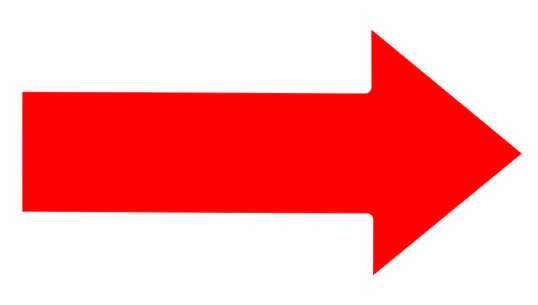
Over to you…
Pause for a moment. Think back to yesterday.
Try jotting down all the fluids you had yesterday. Did you have 6 to 10 glasses? If not, how could you improve your fluid intake?
(Tip: remember to include milk in your cereals, soups, water with medications etc.)
If you are watching your weight, it is best to:
- Choose diet fizzy drinks and no added sugar squash drinks (try to limit diet fizzy drinks to 1 can per day).
- Limit fruit juices to 1 small glass per day.
- Use semi skimmed or skimmed milk in tea and coffee.
- Avoid adding sugar to tea and coffee.
Meals and snacks
After a brain injury, it can be challenging to get back to your normal routine or to establish a new one. Eating regular meals each day can really help with routine and day structure. It also helps with your recovery and general health.
Try to eat small meals every 3 to 4 hours.
Balance your meals out from a combination of different food groups.
More information on healthy eating and food groups can be found in the Eatwell diagram below or visit NHS Inform.
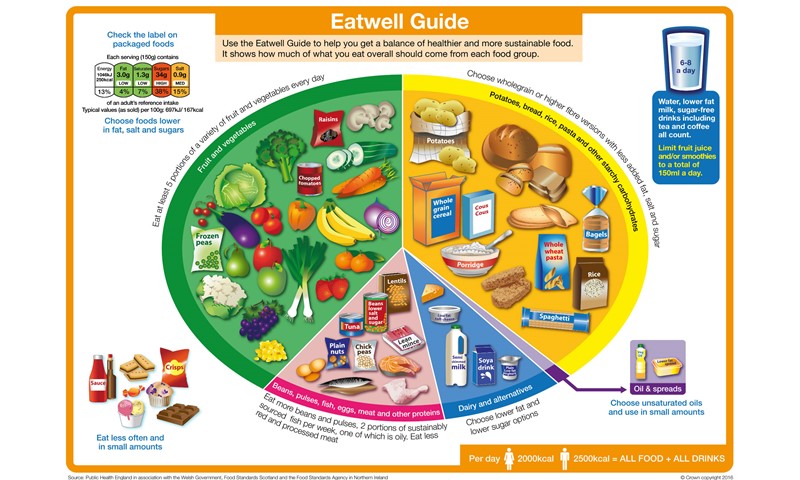
Do not overeat at mealtimes as this can make you feel sleepy.
If you are struggling with memory after your brain injury, set a timer on your watch or phone to remind you when it is time to eat. Aim to eat breakfast, lunch and dinner each day, with healthy snacks between meals.
Weight gain can be common after a brain injury. This is another important reason to follow a healthy balanced diet.
Keep healthy snacks handy for eating in between meals. More information on healthy snacks can be found at the British Dietetic Association (BDA) website.

Over to you…
Pause for a moment. Think back to yesterday or a day during the past week.
Try to write down everything you ate and drank in that day.
Did you eat regular meals and snacks?
Were your food choices well balanced from the different food groups?
If not, think about how you could improve your meal pattern and food choices.
Below you will find some ideas for healthy snacks which you may like to try.
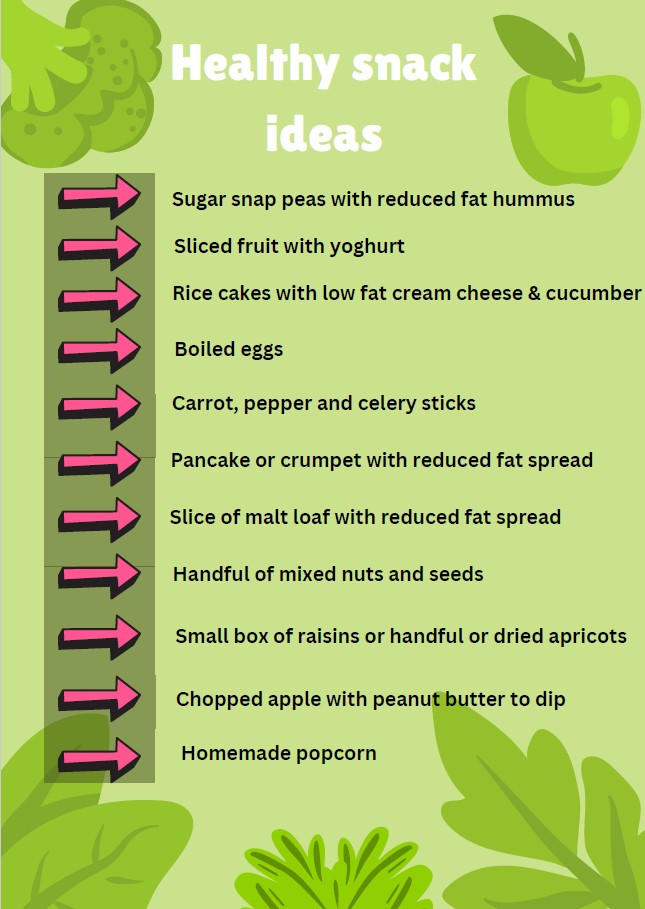
After a brain injury, you may feel like food shopping and meal planning are quite overwhelming. The tools below may help.
The meal planner can be used to jot down ideas for meals you think you would like to have. You can then fill in the shopping list. Try ticking off the items as you add them to your trolley or basket.
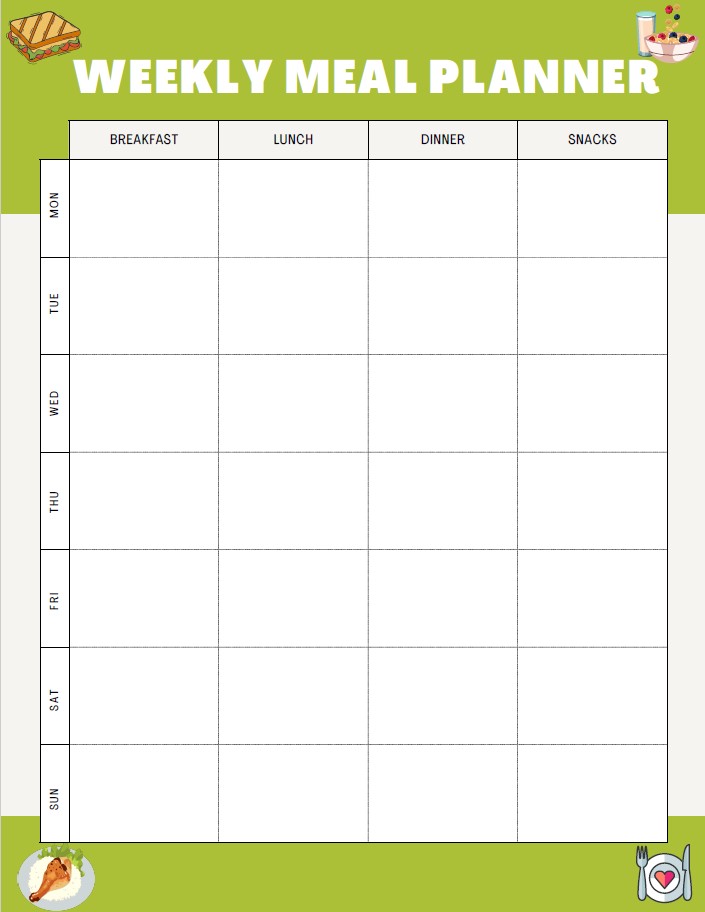
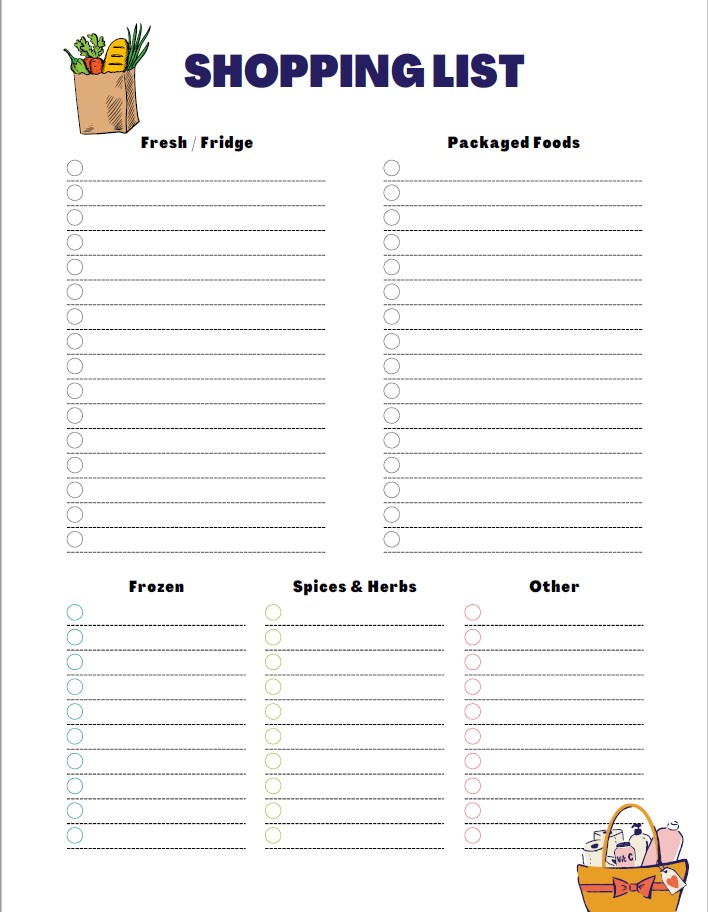
Here is an example of what your completed shopping list might look like. You could use this one to help with ideas of what to buy.
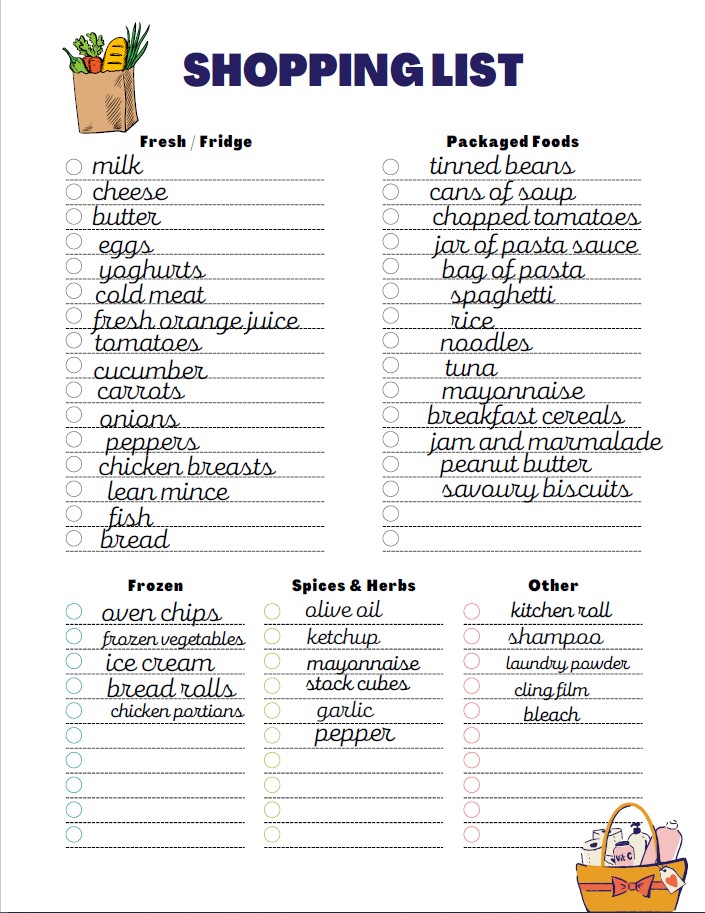
Section three: Healthy weight and poor appetite
Healthy weight
After a brain injury, you may lose weight. This can be from losing muscle mass if you are less active than before and from spending time in hospital. The side effects from some medications can also make you lose weight.
However, further on in your recovery, it can be common for you to gain weight.
This could be due to:
- less activity and exercise
- more snacking or comfort eating because you are bored
- difficulty with your memory, processing, planning and organisational skills. This might mean you reach for easier, less healthy foods than you did before your brain injury
Food energy is measured in calories. If you have more calories than your body needs, it is stored as fat, and you put on weight. Being too fat or too thin is not good for your health.
Tips for weight loss:
- To lose weight you need to take in fewer calories and be more active
- Try drinking a large glass of water before you eat
- Try not to eat sugary foods or drink sugary drinks
- Fill up on fruits and vegetables; aim for 5 portions each day
- Reduce the number of takeaways and processed foods you have
- Try to plan your meals in advance; you could get a relative or friend to help you with this.
- Make a shopping list before you buy your food. This can help with memory and prevent you from buying foods on impulse.
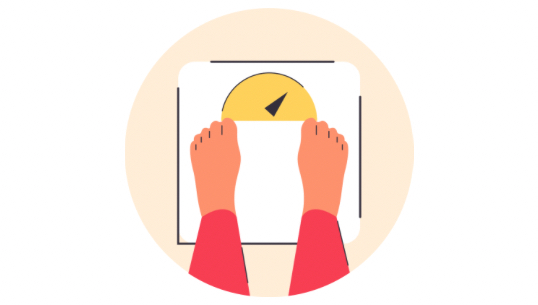
Follow the links below for more help on healthy weight management. Lanarkshire offers a free 15-week course called Weigh to Go which provides support, education and free fitness classes.
North Lanarkshire residents: Weigh to go (activenl.co.uk)
South Lanarkshire residents: Weigh to Go – South Lanarkshire Leisure and Culture
Poor appetite
Sometimes after a brain injury, you may find that you lose weight without trying to and you may lose your appetite and interest in food.
If you have a poor appetite and weight loss, try your best to still eat regular meals each day, even if your portion sizes are smaller than normal.
Here are some other tips which might help:
- Eat little and often, aiming for 3 meals and 3 between-meal snacks each day
- Choose full fat and full sugar products to make your food as nourishing as possible
- Try to include a dessert each day e.g. Ice cream, thick and creamy yoghurt, apple pie with custard
You may have been given nutritional supplement drinks while in the hospital after your brain injury.
If you are no longer taking these but still have a poor appetite, try some of the suggestions in the table below.
They have a similar number of calories to the drinks and could be good to include in your diet, between meals:
| Snack | Calories (kcal) | Protein (grams) |
| Plain scone with butter and jam spread thickly | 272 | 4 |
| Two plain digestive biscuits with cheese | 305 | 12 |
| Hot chocolate drink made with full cream milk and one digestive biscuit | 295 | 10 |
| Danish pastry | 400 | 6 |
| Packet of crisps and a glass of full cream milk | 328 | 10 |
| One croissant with butter | 290 | 5 |
| One slice of toast with melted cheese | 243 | 13 |
| One packet of peanuts | 300 | 13 |
| Two chocolate digestive biscuits and a glass of full cream milk | 342 | 10 |
| One slice of fruit cake and butter | 286 | 3 |
| One portion of trifle | 272 | 6 |
| One medium sausage roll | 286 | 4 |
| One small pork pie | 282 | 7 |
| Sponge pudding and custard | 440 | 9 |
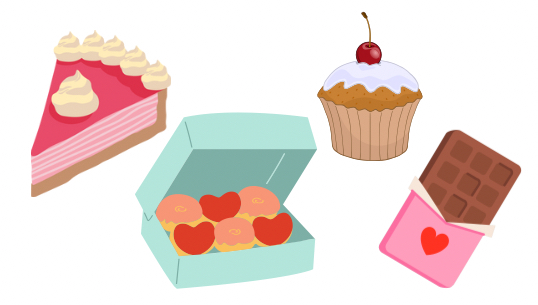
Taste and smell changes
After your brain injury, you might notice that things taste and smell different. This can really affect your quality of life and how much you enjoy food and drinks.
Changes to your taste and smell can affect your appetite and eating in many ways.
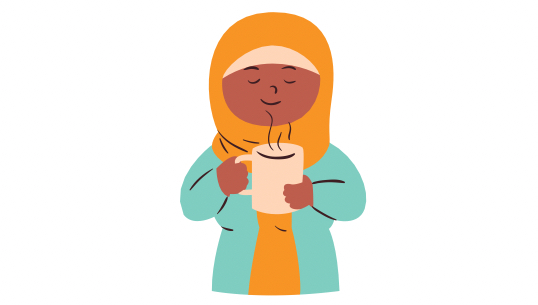
Section four: Fatigue
Since your brain injury, you may find you feel very fatigued (extremely tired). You will learn a lot about managing fatigue in module 2.
A healthy well-balanced diet is very important to help you manage your fatigue. This will help to maintain your energy levels. Each of the food groups have a role to play in helping to manage your fatigue. We have already looked at the food groups in the Eatwell Guide earlier on in this module. Here are a few ways in which each group can be important in helping with fatigue:
Bread, cereals and potatoes –
These foods are the main energy source for our bodies. These are types of carbohydrate. It is important to choose wholegrain or high fibre carbohydrate foods as these are broken down more slowly by your body. This helps to release the energy from foods gradually and avoids peaks and troughs in your energy levels.
Fruit and vegetables –
We are recommended to aim for 5 portions of fruit and vegetables each day. (WHO, 2003) This lets us get a good mix of vitamins and minerals. If your diet is low in certain vitamins and minerals, this can make you feel more fatigued.
Meat, fish and alternatives –
These are types of protein. It is a good idea to choose low fat protein to make sure your body gets the nutrients it needs for muscle strength and to help with good recovery. You can include non-meat protein foods, such as beans, pulses, nuts, quorn etc.
Milk and Dairy foods –
This group includes milk, cheese and yoghurt. These are the main source of a nutrient called Calcium. Calcium is needed by your body to help you have healthy teeth and bones.
Vitamin and mineral supplements –
Lack of the following nutrients is known to cause fatigue:
- Iron
- Vitamin B12
- Folate
If you are following a well-balanced diet, there should be no need to take any extra vitamin or mineral supplements as you should be getting enough of these nutrients already. However, if your blood results show low levels, your doctor or healthcare professional might advise you to take a supplement.
Other tips for managing fatigue:
- Try to plan your meals in advance – on days where you have more energy, plan out what you might want to eat for the rest of the week.
- Prepare foods in advance where possible and make some extra portions to store in the fridge or freezer for using later. Get a relative or friend to help you prepare foods if need be.
- Make use of ready-made meals so you are not using up energy in food preparation.
- Make a list of your favourite fast, easy meal ideas.
- Keep menus simple and easy – avoid recipes with too many steps or unusual ingredients which you might find overwhelming and exhausting.
- Try online food shopping to save your energy.
- Keep a stock cupboard of essential items which you can use to make easy, quick and healthy meals and snacks.
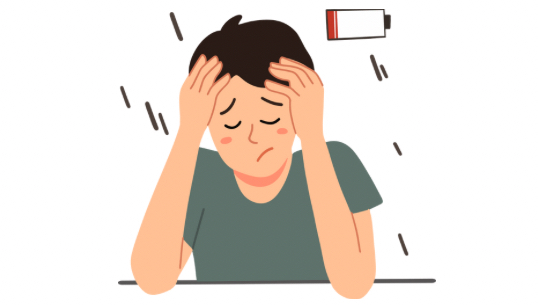
Special diets
If you need to follow a special diet due to a pre-existing medical condition or a food allergy, please ask your Dietitian for more specific advice tailored to your needs.
You should now feel more confident about how your brain injury may affect your eating and drinking, and what strategies you can use to help yourself. If you feel you still need more information, please ask to be referred to a Dietitian who can look at your diet in more detail with you.
Resources
For further information and help, here is a list of some useful links:
- Healthy eating: Eatwell Guide – Food and nutrition | NHS inform
- Healthy snack ideas: Healthy snacks | British Dietetic Association (BDA)
- Eating on a budget: Eat well, spend less | British Dietetic Association (BDA)
- Poor appetite and weight loss: Spotting and treating malnutrition | British Dietetic Association (BDA)
- Fruit and vegetables: Fruit and vegetables – how to get five a day | British Dietetic Association (BDA)
- Weight management: Weight Loss | British Dietetic Association (BDA)
- Taste and smell changes: 5 ways to cope with taste and smell problems after brain injury | Headway
- Weight To Go: Weigh to Go and Weigh to Go Maintenance | NHS Lanarkshire (scot.nhs.uk)

